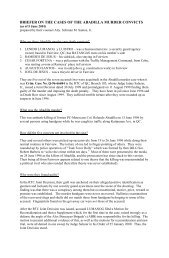Republic of the Philippines - Campaign
Republic of the Philippines - Campaign
Republic of the Philippines - Campaign
Create successful ePaper yourself
Turn your PDF publications into a flip-book with our unique Google optimized e-Paper software.
APPELLANTS’ BRIEF<br />
People <strong>of</strong> <strong>the</strong> <strong>Philippines</strong> vs. Fortuna, et. al.<br />
S. C. G. R. No. 141660-64<br />
should not have concerned him because his duty was to his<br />
clients and not to <strong>the</strong> prosecution or to <strong>the</strong> police investigators.”<br />
“Moreover, when he interviewed appellants, he did not<br />
even bo<strong>the</strong>r to find out <strong>the</strong> gist <strong>of</strong> <strong>the</strong>ir proposed statements in<br />
order to be able to inform <strong>the</strong>m properly <strong>of</strong> <strong>the</strong> nature and<br />
consequences <strong>of</strong> <strong>the</strong>ir extra-judicial confessions. Clearly and<br />
sadly, appellants were not accorded competent and independent<br />
counsel whom <strong>the</strong>y could rely on to look after <strong>the</strong>ir interests.”<br />
(People vs. Suela, 373 SCRA 163, 185)<br />
How <strong>the</strong>n, can Joel de Jesus and Lorenzo delos Santos have been assured <strong>of</strong> an<br />
able and competent assistance from <strong>the</strong>se counsels who have been proven to protect not<br />
<strong>the</strong> interest <strong>of</strong> <strong>the</strong> suspects brought before <strong>the</strong>m for legal assistance but that <strong>of</strong> <strong>the</strong><br />
prosecution or police investigators?<br />
3. The suspects were held incommunicado, tortured and forced to admit to a<br />
crime <strong>the</strong>y did not commit.<br />
Both Joel de Jesus and Lorenzo delos Santos were forced to confess to <strong>the</strong> crime<br />
and to implicate <strong>the</strong>ir co-accused through <strong>the</strong> use <strong>of</strong> torture, force, violence, coercion and<br />
intimidation which vitiated <strong>the</strong>ir free will in signing <strong>the</strong> confessions presented by <strong>the</strong><br />
prosecution in court. They were also detained in secret places and were held<br />
incommunicado by preventing <strong>the</strong>m from making any contact with any o<strong>the</strong>r person<br />
during <strong>the</strong>ir confinement while <strong>the</strong>ir confessions were being extracted from <strong>the</strong>m.<br />
All <strong>the</strong>se prove that <strong>the</strong> confessions <strong>of</strong>fered by <strong>the</strong> prosecution also fail <strong>the</strong> test <strong>of</strong><br />
voluntariness this Court speaks <strong>of</strong> in People vs. Muleta. (op.cit.)<br />
“If <strong>the</strong> extra-judicial confession satisfies <strong>the</strong>se<br />
constitutional standards, it is subsequently tested for<br />
voluntariness, i.e., if it was given freely – without coercion,<br />
intimidation, inducement, or false promises; and credibility, i.e.,<br />
if it was consistent with <strong>the</strong> normal experience <strong>of</strong> mankind.”<br />
“A confession that meets all <strong>the</strong> foregoing requisites<br />
constitutes evidence <strong>of</strong> a high order because no person <strong>of</strong> normal<br />
mind will knowingly and deliberately confess to be <strong>the</strong><br />
perpetrator <strong>of</strong> a crime unless prompted by truth and conscience.<br />
O<strong>the</strong>rwise, it is disregarded in accordance with <strong>the</strong> cold<br />
objectivity <strong>of</strong> <strong>the</strong> exclusionary rule.” (ibid. p. 161-162)<br />
Page 76 <strong>of</strong> 127<br />
76




